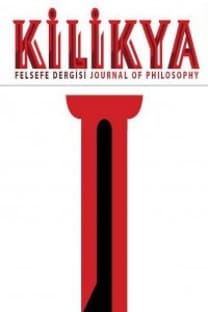Geç Dönem Wittgenstein Felsefesinde Gramer Kavramı ve Dilin Otonomisi
Wittgenstein, anlam, dilin otonomisi, gramer
The Concept of Grammar and Autonomy of Language in the Philosophy of Late Wittgenstein
Wittgenstein, meaning, grammar, autonomy of language,
___
- Baker, G. ve Hacker P. M. S. (2009). Wittgenstein Rules, Grammar and Necessity. Wiley-Blackwell, Singapore.
- Cavell, S. (1976). Must We Mean What We Say? Cambridge University Press, Cambridge, New York, Melbourne.
- Cavell, S. (1979). The Claim of Reason: Wittgenstein, Skepticism, Morality and Tragedy. Oxford University Press: Oxford.
- Foster, Michael, N. (2004). Wittgenstein on The Arbitrariness of Grammar. Princeton University Press: Princeton, Oxford.
- Glock, H. J.(1996). A Wittgenstein Dictionary. Blackwell Publishers, Oxford.
- Malcolm, N., Georg Henrik von Wright. (1984). Ludwig Wittgenstein: A Memoir.Oxford University Press: USA
- Monk R. (2005). Ludwig Wittgenstein: Dahinin Görevi. Çev. Berna Kılınçer, Tülin Er. Kabalcı Yayınları: İstanbul.
- Wittgenstein, L. (1978). Philosophical Grammar. Ed. Rush Rhess. Çev.Anthony Kenny. University of California Press: Berkeley, Los Angeles.
- Wittgenstein, L. (1978). Remarks on the Foundations of Mathematics. Ed. G. H. Wright, R, Rhees, G.E.M. Anscombe. İng. Çev. G. E. M. Anscombe. MIT Press: Cambridge. Massachusetts, London.
- Wittgenstein L. (1979). Wittgenstein’s Lectures: Cambridge 1932-1935. Ed. Alice Ambrose. Basil Blackwell: Oxford.
- Wittgenstein L. (1982). Wittgenstein’s Lectures: Cambridge 1930-1932. Ed. D. Lee, University of Chicago Press: Chicago.
- Wittgenstein L. (1989). Lectures on Foundations of Mathematics. Ed. Cora Diamond. Cornell University Press: New York.
- Wittgenstein, L. (2004). Defterler. Ed. G. H. von Wright, G. E. M. Anscombe. Çev. Ali Utku. Birey Yayıncılık: İstanbul.
- Wittgenstein, L. (2004). Zettel. Çev. Doğan Şahiner. Nisan Yayıncılık: İstanbul.
- Wittgenstein, L. (2005). Tractatus Logico-Philosophicus. Çev. Oruç Aruoba. Metis Yayınları: İstanbul.
- Wittgenstein, L. (2007). Felsefi Soruşturmalar, Çev. Haluk Barışcan. Metis Yayınları: İstanbul.
- Wittgenstein, L. (2007). Mavi Kitap Kahverengi Kitap. Çev. Doğan Şahiner, İş Bankası Kültür Yayınları: İstanbul.
- Wittgenstein, L. (2009). Kesinlik Üzerine + Kültür ve Değer. Çev. Doğan Şahiner. Metis Yayınları: İstanbul.
- Yayın Aralığı: 2
- Başlangıç: 2014
- Yayıncı: Eray Yağanak
What is Conditional Probability? In Defense of Lowe’s Definition(s)
Bilgi, Eğitim ve Sorgulamanın Açıklığında Modern Üniversiteleri (Yeniden) Düşünmek
Heidegger’de Metafizik Eleştirisi olarak Sanat Yapıtı
Geç Dönem Wittgenstein Felsefesinde Gramer Kavramı ve Dilin Otonomisi
Heidegger Felsefesinde Zamansallığın Göstereni Olarak Sıkıntı Kavramı
Marksist Kurama Bir Katkı: Lukacs’ın İdeoloji Kavramsallaştırması
